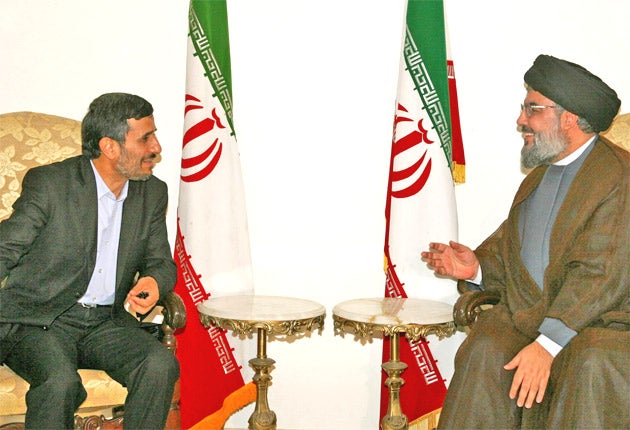Lebanon – land of phantom oil deals, spies and political murder
Robert Fisk on the real story behind Mahmoud Ahmadinejad's recent visit

While the West reacted with predictable horror to the Lebanese visit of President Mahmoud Ahmadinejad of Iran – the US President Barack Obama called it "provocative" while Israel claimed that its northern neighbour was now "a hub of regional terror" – it largely failed to notice that the Iranians were busy signing a set of massive energy, oil exploration and economic agreements with Lebanon.
They included a £300m Iranian letter of credit for the Lebanese to begin financing new projects – possibly including two new power stations and a direct electricity link between the two countries via Turkey.
On the surface, it's easy to see all this as another attempt by Iran to dominate Lebanon through oil and electricity – and the Lebanese government's acceptance of the agreements as a sign of submission. Lebanon is believed to have considerable reserves of oil off the northern city of Tripoli which Iran suggested it might be able to explore – other fields may lie further south, close to Israel. Certainly, the Lebanese, who in some regions suffer eight-hour power cuts every day, are ready to allocate more than £1bn to the electrical project, with £1.5bn from the private sector and another £600m from largely western donor nations. This will come as something of a shock to the donors.
But, like everything in Lebanon, the whole fandango is more mirage than reality, as the Lebanese economist Marwan Iskander discovered when he researched his files. For the Iranians are demanding a matching guarantee of £300m from the Lebanese Central Bank – which it cannot provide without breaching UN sanctions against Iran. In fact, Iskander says, Iran wrote out a £75m pledge to Lebanon 10 years ago which the Central Bank could not guarantee – and for the same reason. The UN thus long ago put Iran out of the sub-financing business in this part of the Middle East.
And the dark spectre of Iranian oil men drilling the Mediterranean seabed 70 miles north of the Israeli border is also illusory. French and Norwegian companies have done much of the drilling in Iran; the refining has been carried out by French and Italian companies. Now the Russians and Chinese are doing the same job in Iran. The idea that Tehran would furnish cash to pay Moscow and Peking to explore reserves off Lebanon is close to fantasy.
So why on earth did the Iranian Foreign Minister Manouchehr Mottaki and the Lebanese Energy Minister Gebran Bassil sit down to sign those 17 agreements a week ago? Herein lies a tale. For it just so happens that Mr Bassil is the son-in-law of the Christian Maronite ex-general Michel Aoun whose political party long ago aligned itself with Syria and Iran. In Lebanon, its Christian supporters have thus found themselves an ally of Hizbollah and in opposition to the majority government of the Prime Minister Saad Hariri.
On the surface, this makes sense. Aoun is helping the Iranians to move into the Lebanese economy. But right now, the ex-general has a few other things on his mind. For a start, three of the team of alleged spies for Israel arrested by the Lebanese army over the past nine months have turned out to be working for Aoun's party. And this "spy ring" is supposed to have been involved in amassing data within the Lebanese communications system. Indeed, one of them was a senior official in Lebanon's largest mobile telephone network.
But the plot thickens. Hizbollah is deeply concerned that forthcoming accusations by the UN international tribunal in The Hague will finger members of the militia in the murder of Prime Minister Hariri's father Rafic on 14 February, 2005. Sayyid Hassan Nasrallah, the chairman of Hizbollah, has already denounced such accusations in advance – and suggested that the Israeli spy network inserted false phone traffic into the mobile phone records of the day of the murder; in other words, the records – a key part of the tribunal's evidence – were deliberately tampered with in order to implicate Hizbollah members in the murder.
And it has to be said that immediately after Rafic Hariri's killing, the UN was quietly pointing the finger at Syria rather than its Hizbollah ally. A censored UN report originally named four Syrian figures supposedly involved in the assassination. But now – after Der Spiegel (and its Israeli informants) suggested Hizbollah men were to blame – everyone is suspecting Israel's most security-conscious enemy in the Middle East of the crime. It's not unlike the Lockerbie airliner bombing, when the Syrians were originally fingered and then – when Syria's help was needed in the coalition against Saddam following his invasion of Kuwait in 1990 – the West started blaming Libya.
And those 17 Iranian-Lebanese agreements? Just bits of paper, maybe, signed by Bassil to keep the heat off his father-in-law's embarrassment. Spies and dodgy oil deals and a five-year murder hunt. It had to happen in Lebanon.
Join our commenting forum
Join thought-provoking conversations, follow other Independent readers and see their replies
Comments
Bookmark popover
Removed from bookmarks